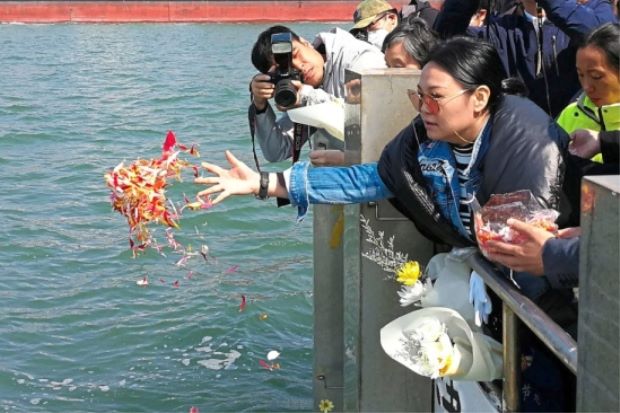SHANGHAI: The general procedure for sea burials in Shanghai is simple: After a traditional funeral service onboard a ship, family members of the deceased are taken to the designated waters, where they scatter the cremation ashes of their loved one, along with flower petals. After that, they bow to the sea to bid farewell.
According to a report by the Shanghai Funeral Service Centre, the ashes of 44,652 deceased residents in the city have been scattered through this dignified, simple service since the city started sea burials in 1991.
The desire to consign cremated ashes to the deep is growing among Shanghai residents whose last wish is no longer to have their ashes stored in columbaria, or sepulchral vaults.
Wang Yan, a manager from Feisi, the only operator of the city’s sea burial services, said that there were 4,132 people buried at sea in 2018. She expected the number to rise to 4,500 this year. In 1991, there were fewer than 300.
Wang said the service is provided twice a day, seven days a week, with one ship capable of carrying more than 300 people.
Shanghai has offered incentives to encourage the public to choose sea burials since 1999.
It pays subsidies to the families of the deceased, with the amount soaring to 4,600 yuan (RM2,793) this year, up from a mere 150 yuan (RM91) in 1999.
The family receives 3,000 yuan (RM1,821) and the burial company receives 1,600 yuan (RM971).
Since 2007, the city has designated a public memorial day for sea burials. It usually takes place in March, ahead of the Qingming festival, or Tomb Sweeping Day, which falls on April 4 or 5.
For thousands of years, Chinese have held on to the tradition that the dead should be buried in coffins in the ground beside their ancestors. It has sacred meanings, with deep attachment to the homeland.
With the increasing population in modern times, however, the custom has put a strain on the country’s land resources.
China has banned the burial of bodies in its most populous areas in recent years.
The only exceptions are for 10 ethnic minorities. Most urban residents select cremation after death, with the ashes interred in tombs in cemeteries. — China Daily/Asia News Network
